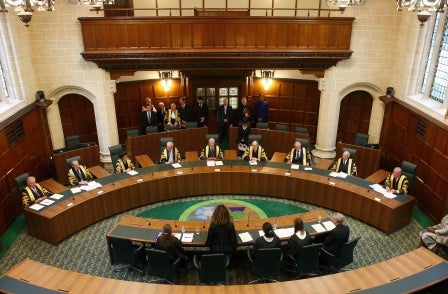
The Supreme Court has ruled that the former head of Her Majesty’s Revenue and Customs broke the law by talking to journalists “off the record” about a multi-billion pound tax avoidance scheme.
A leading tax lawyer has warned that it is a ruling which is likely to make government departments more secretive and reluctant to speak to journalists.
It will also leave the government with a costs bill running into millions of pounds, a civil claim for damages and means the source – former head of HMRC Dave Hartnett – could himself face a criminal prosecution.
Hartnett, who stepped down as head of HMRC in 2012, said he believed he was speaking to two Times journalists “off the record” and on a background basis on 14 June 2012.
But The Times journalists apparently believed that he was speaking to them for quoting, but did not wish to be named.
The conversation led to the publication of two articles a week later in which The Times revealed how Patrick McKenna’s Ingenious Media had enabled investors to avoid paying £5bn in tax via film investment schemes.
It quoted a “senior revenue official” who said: “He’s an urbane man, …, he’s a clever guy, he’s made a fortune, he’s a banker, but actually he’s a big risk for us so we would like to recover lots of the tax relief he’s generated for himself and other people.”
McKenna sued HMRC over the disclosures to The Times and lost at the High Court and Court of Appeal.
But now the Supreme Court has ruled that Hartnett breached the Commissioners for Revenue and Customs Act 2005 by speaking to The Times journalists.
Tax QC Jolyon Maughan told Press Gazette: “This judgment means that HMRC will be even less forthcoming than presently in response to requests for information from journalists.
“This will also be true of other government departments who will have similar duties. The real question is whether that is something that is good for democracy.
“People are concerned about whether the likes of Google and Facebook are being charged the right amount of tax. They are concerned about the activities of wealthy individuals who hold assets in and through tax havens and they are going to become more and more concerned as HMRC becomes less and less responsive to those concerns. That’s inevitably going to be the consequence of this decision.”
Hartnett said he spoke to The Times because “it was generally in HMRC’s interests to try to establish good relations with the financial press; that they provided a way of emphasising to the general public HMRC’s views on elaborate tax avoidance schemes”.
He also said he thought The Times journalists might have information of value to HMRC and that that he did not anticipate that his off the record comments about Mr McKenna and Ingenious Media would be published.
Lord Toulson said in his judgment: “The whole idea of HMRC officials supplying confidential information about individuals to the media on a non attributable basis is, or should be, a matter of serious concern.
“I would not seek to lay down a rule that it can never be justified, because ‘never say never’ is a generally sound maxim.
“It is possible, for example, to imagine a case where HMRC officials might be engaged in an anti-smuggling operation which might be in danger of being wrecked by journalistic investigations and where for operational reasons HMRC might judge it necessary to take the press into its confidence, but such cases should be exceptional.”
Times legal director Pia Sarma said: “It’s worrying that the focus seems to be turning on people who want to talk to journalists. Punishing them without looking at their reasons discourages whistleblowers and threatens to dry up the information flow that is so crucial if journalism is to ask difficult questions.”
The investigation by Times Journalists Alexi Mostrous and Fay Schlesinger into tax avoidance schemes won prizes at the 2012 British Journalism Awards and at the Press Awards.
Read the Supreme Court ruling in full.
Email pged@pressgazette.co.uk to point out mistakes, provide story tips or send in a letter for publication on our "Letters Page" blog

